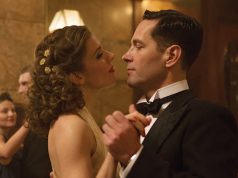“Hart’s War” boasts solid performances against a bricolage of ideas, of which the more interesting are underused and the less interesting are overused.
It’s an unusual logical paradox that one of the best threads in the film is one in which the hero chickens out and does something cowardly — which is the same thing the movie does, addressing an interesting idea like cowardice among heroes, then getting scared and retreating to the safety of such well-worn war-movie themes as “honor” and “bravery.”
I’m all for film heroes being honorable and brave, but do those ideas have to be the central focus of every single military movie?
“Hart’s War” is about a lot of things for a while, before finally settling on the honor thing. Colin Farrell plays Lt. Tommy Hart, a Yale-educated senator’s son who, when captured by the Germans in 1944, behaves with something less than valor. He then winds up in a POW camp, where the commanding American officer is Col. William McNamara (Bruce Willis).
It’s a bit like “Hogan’s Heroes” from there, except not as funny, with the U.S. soldiers not subjected to any particularly cruel treatment, and the German officers more or less letting them do what they want. It’s like summer camp, but in the winter, and with a strict curfew.
A couple of black American officers arrive before long, and the racism in the ranks starts to emerge in all its ugliness. Soon there is an execution, and then a murder, and then a court martial. Hart, who was studying to be a lawyer, has to defend a black man — which, it is pointed out, wouldn’t even be necessary if he were back in Alabama, because the man would have been lynched without trial.
So are we focusing on racism here, or on Hart’s momentary cowardice and its effects? The former is the subject of some platitudes but ultimately little substance; the latter goes nowhere. (This is indeed too bad. In the movies, whenever the Germans capture the G.I.s and say, “Ve half vays of making you talk,” the G.Is always refuse to talk. But what if one of them finally did?)
Farrell is winning in his role, and Willis is fine, though with maybe a little too much teeth-gritting for my tastes. Also very good is Marcel Iures as the German commandant Visser, who conveys evil and humanity by turns and avoids caricature.
The manner in which director Gregory Hoblit (“Frequency,” “Primal Fear”) portrays the lifestyle within the POW camp is interesting, and certainly good prisoner-of-war movies have been made before. This one becomes utterly unbelievable in its last 15 minutes, betraying what to that point had been a decent, if rather pedestrian, war picture.
B- (; )





